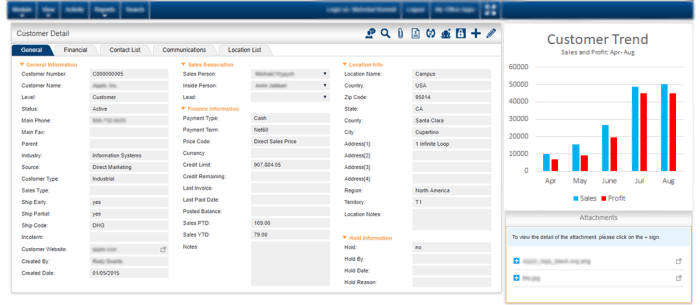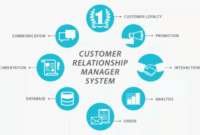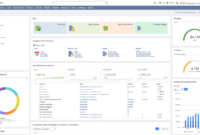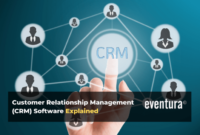Small business CRM is more than just a software; it’s a powerful tool that can transform the way you manage customer relationships. Imagine having a single platform to organize your contacts, track interactions, and personalize communications. With a CRM, you can gain valuable insights into your customers’ preferences, anticipate their needs, and build stronger, lasting relationships.
By streamlining your processes, automating tasks, and centralizing your data, a CRM system can empower your small business to reach new heights. It can help you improve customer satisfaction, boost sales, and enhance operational efficiency. Whether you’re a startup, a small shop, or a service-based business, a well-chosen CRM can be a game-changer for your success.
Introduction to Small Business CRM
A small business CRM (Customer Relationship Management) system is a software solution designed to help small businesses manage their interactions with customers and potential customers. It helps businesses organize and track customer data, streamline communication, and ultimately improve customer relationships.CRM systems are essential for small businesses because they can help to improve efficiency, boost sales, and enhance customer satisfaction.
Key Features and Functionalities of a Small Business CRM System
A typical small business CRM system offers a range of features designed to manage customer interactions and data effectively.
- Contact Management:This feature allows businesses to store and organize customer information, including contact details, purchase history, communication preferences, and notes. It provides a centralized hub for all customer-related data.
- Sales Management:CRM systems help businesses track sales opportunities, manage leads, and monitor the sales pipeline. They provide tools for creating quotes, generating invoices, and managing sales processes efficiently.
- Marketing Automation:Many CRM systems include marketing automation features that allow businesses to create and manage email campaigns, track marketing performance, and personalize customer communications. This helps to reach the right customers with the right message at the right time.
- Customer Support:CRM systems can help businesses manage customer support inquiries, track issues, and provide timely resolutions. They can also help businesses collect customer feedback and improve customer satisfaction.
- Reporting and Analytics:CRM systems provide valuable insights into customer behavior, sales performance, and marketing effectiveness. They generate reports and dashboards that allow businesses to analyze data and make informed decisions.
Types of CRM Systems for Small Businesses
There are various types of CRM systems available, each with its own strengths and weaknesses. Small businesses can choose the type that best suits their needs and budget.
- Cloud-Based CRM:Cloud-based CRM systems are hosted on remote servers and accessed through the internet. They are typically more affordable and easier to set up and maintain than on-premise systems. Examples include Salesforce, Zoho CRM, and HubSpot CRM.
- On-Premise CRM:On-premise CRM systems are installed and hosted on the business’s own servers. They offer more control and customization but require a higher upfront investment and ongoing maintenance costs. Examples include Microsoft Dynamics 365 and SAP CRM.
- Specialized CRM:Specialized CRM systems are designed for specific industries or business functions. For example, there are CRM systems for e-commerce, healthcare, and real estate. These systems offer features tailored to the specific needs of the industry.
Benefits of Using a Small Business CRM
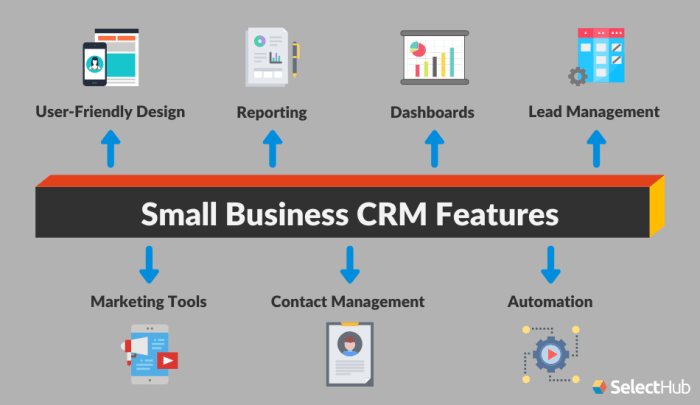
A CRM system can be a game-changer for small businesses, offering a wide range of benefits that can boost efficiency, improve customer relationships, and ultimately drive growth.
Improved Customer Relationships
A CRM system helps small businesses build stronger relationships with their customers by providing a centralized platform to manage customer interactions and data.
- Personalized Communication:By storing customer information such as preferences, purchase history, and communication styles, a CRM system allows businesses to personalize their interactions, making customers feel valued and understood. This can lead to increased customer satisfaction and loyalty.
- Proactive Engagement:CRM systems can be used to automate personalized communication, such as birthday greetings, special offers, or follow-up messages after a purchase. These proactive interactions keep customers engaged and foster a sense of connection.
- Improved Customer Service:By providing a comprehensive view of customer interactions, a CRM system helps businesses resolve customer issues faster and more efficiently. This leads to increased customer satisfaction and reduces the likelihood of customer churn.
Increased Sales
A CRM system can significantly contribute to sales growth by streamlining sales processes and providing valuable insights into customer behavior.
- Lead Management:CRM systems help businesses manage and nurture leads effectively. They can track lead sources, prioritize leads based on their potential, and automate follow-up communication, ensuring that no potential customer is missed.
- Sales Forecasting:By analyzing sales data and customer behavior, CRM systems can provide valuable insights into sales trends and help businesses forecast future sales. This allows for better planning and resource allocation.
- Cross-Selling and Upselling:CRM systems can identify opportunities for cross-selling and upselling by analyzing customer purchase history and preferences. This helps businesses increase revenue by offering additional products or services that align with customer needs.
Enhanced Efficiency
By automating tasks and streamlining workflows, a CRM system can significantly improve the efficiency of small businesses.
- Task Automation:CRM systems can automate repetitive tasks, such as sending email campaigns, scheduling appointments, and generating reports. This frees up time for employees to focus on more strategic initiatives.
- Centralized Data Management:A CRM system provides a single source of truth for all customer data, eliminating the need for multiple spreadsheets and databases. This ensures data consistency and improves access to information.
- Improved Collaboration:CRM systems facilitate collaboration among sales, marketing, and customer service teams by providing a shared platform for communication and information sharing. This improves team efficiency and reduces communication silos.
Choosing the Right Small Business CRM
Finding the perfect CRM for your small business can be a daunting task, with so many options available. Choosing the right CRM system can significantly impact your business operations, customer relationships, and overall success.
Factors to Consider When Choosing a CRM
It’s crucial to consider several factors before making a decision. These factors can help you narrow down your options and find a system that meets your specific needs.
- Budget:CRMs come with various pricing plans, ranging from free to expensive enterprise-level solutions. It’s important to determine your budget and find a CRM that fits within your financial constraints.
- Size of Your Business:The size of your business will influence the features you need. Smaller businesses might require a simpler CRM, while larger businesses may benefit from more complex features.
- Industry:Different industries have specific requirements. For example, a CRM for a retail business may need to handle inventory management, while a CRM for a service-based business might prioritize appointment scheduling.
- Specific Needs:Consider the specific needs of your business. Do you need a CRM with robust marketing automation features? Do you need to track customer service interactions? Or are you looking for a CRM that can help you manage sales pipelines?
Comparing CRM Solutions
The market offers a wide range of CRM solutions, each with unique features, pricing, and ease of use. Here’s a comparison of some popular CRM systems:
| CRM System | Key Features | Pricing Plans | Pros | Cons |
|---|---|---|---|---|
| Zoho CRM | Sales automation, marketing automation, customer support, analytics | Free, Standard, Professional, Enterprise | Comprehensive features, affordable pricing, user-friendly interface | Can be complex for smaller businesses |
| Salesforce | Sales automation, marketing automation, customer service, analytics, app integration | Essentials, Professional, Enterprise, Unlimited | Powerful features, robust app ecosystem, excellent customer support | Expensive, complex setup, steep learning curve |
| HubSpot CRM | Sales automation, marketing automation, customer service, analytics, free website builder | Free, Starter, Professional, Enterprise | Free plan with essential features, strong marketing automation capabilities, user-friendly interface | Limited features in the free plan, some features require paid add-ons |
| Pipedrive | Sales pipeline management, deal tracking, email integration, reporting | Essential, Advanced, Professional, Enterprise | Focus on sales pipeline management, intuitive interface, affordable pricing | Limited marketing automation features, basic reporting capabilities |
Implementing and Using a Small Business CRM
Implementing a CRM system is more than just installing software. It’s about integrating it into your business processes, training your team, and maximizing its potential.
Data Migration, Small business crm
Data migration is the process of transferring your existing customer data from your current system into the CRM. This step is crucial to ensure you have a complete and accurate picture of your customers from the start.
- Identify the data sources:Determine where your customer data is currently stored. This might include spreadsheets, databases, email marketing platforms, or even handwritten notes.
- Clean and standardize the data:Before migrating, ensure your data is accurate and consistent. This might involve removing duplicates, correcting errors, and standardizing formats.
- Choose a migration method:Several methods exist for migrating data, including manual entry, importing files, or using specialized migration tools. Choose the method that best suits your needs and resources.
- Test and validate the data:After migrating the data, verify its accuracy and completeness. Run reports and compare them to your previous data sources to ensure everything is transferred correctly.
User Training
Proper training is essential for your team to effectively use the CRM. This ensures they understand the system’s functionalities and can leverage its features to improve their performance.
- Develop a training plan:Create a comprehensive training plan that covers all essential features of the CRM. Tailor the plan to your team’s roles and responsibilities.
- Provide hands-on training:Don’t just present theory; allow your team to practice using the CRM with real-world scenarios.
- Offer ongoing support:Establish a system for ongoing support, whether through FAQs, online resources, or dedicated CRM support personnel.
- Encourage feedback:Regularly gather feedback from your team on the CRM’s usability and identify areas for improvement.
System Integration
Integrating your CRM with other business systems is essential to streamline processes and avoid data silos.
- Identify key integrations:Determine which systems need to be integrated with your CRM. This might include your website, email marketing platform, accounting software, or e-commerce platform.
- Choose integration methods:Explore various integration methods, including APIs, webhooks, or third-party tools.
- Test integrations thoroughly:After integrating systems, test them rigorously to ensure data flows correctly and smoothly between systems.
Managing Customer Interactions
A CRM system is a powerful tool for managing customer interactions.
- Centralized customer profiles:Store all customer information in one place, including contact details, purchase history, and interactions.
- Track interactions:Record all communication with customers, including phone calls, emails, and live chat conversations.
- Automate communication:Use automation features to send personalized emails, reminders, and follow-ups.
- Segment your audience:Group customers based on shared characteristics to target them with relevant marketing messages.
Tracking Sales Opportunities
CRM systems help you track and manage sales opportunities.
- Create opportunity pipelines:Organize sales opportunities into stages, from lead generation to closing deals.
- Assign tasks and deadlines:Set deadlines and assign tasks to ensure sales opportunities progress efficiently.
- Generate reports:Analyze sales performance data to identify trends and areas for improvement.
Analyzing Performance Data
CRM systems provide valuable data for analyzing business performance.
- Track key metrics:Monitor important metrics like customer acquisition cost, customer lifetime value, and conversion rates.
- Identify areas for improvement:Use data to pinpoint areas where you can improve customer service, sales strategies, or marketing campaigns.
- Make data-driven decisions:Base your business decisions on real data to ensure they are informed and effective.
Maximizing Return on Investment
To maximize your ROI from a CRM system, follow these best practices:
- Set clear goals:Define specific, measurable, achievable, relevant, and time-bound goals for your CRM implementation.
- Regularly review and adjust:Continuously assess the effectiveness of your CRM system and make adjustments as needed.
- Leverage automation features:Use automation features to streamline processes and save time.
- Integrate with other systems:Connect your CRM to other business systems to improve efficiency and data accuracy.
Case Studies of Small Businesses Using CRM
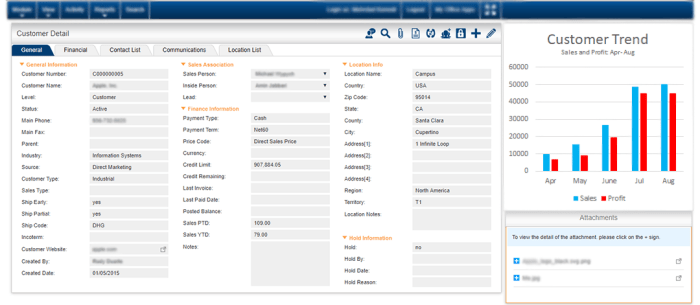
Real-world examples of small businesses using CRM systems demonstrate the potential for significant growth and improvement. These case studies showcase how different businesses overcame specific challenges by implementing CRM solutions, resulting in positive outcomes. Examining these success stories provides valuable insights into effective CRM strategies and their impact on small business operations.
A Boutique Clothing Store’s Personalized Customer Experience
This case study highlights how a small boutique clothing store, “Threads & Trends,” successfully leveraged a CRM system to enhance its customer experience and boost sales.
- Challenge:Threads & Trends struggled to maintain consistent customer engagement and personalized interactions, leading to a decline in repeat purchases and customer loyalty.
- Solution:The store implemented a CRM system that allowed them to collect and analyze customer data, including purchase history, preferences, and communication history. This enabled them to create personalized marketing campaigns, offer tailored recommendations, and provide targeted customer service.
- Outcome:The CRM system helped Threads & Trends achieve a 20% increase in repeat purchases and a 15% rise in customer satisfaction. The store was able to build stronger customer relationships by providing personalized experiences, leading to increased loyalty and sales.
A Local Restaurant’s Improved Customer Retention
This case study explores how a local restaurant, “The Cozy Corner,” utilized a CRM system to enhance customer retention and increase repeat visits.
- Challenge:The Cozy Corner faced difficulties in retaining customers and encouraging repeat visits. The restaurant lacked a systematic approach to collecting customer data and providing personalized experiences.
- Solution:The Cozy Corner implemented a CRM system that enabled them to gather customer data, such as contact information, dining preferences, and feedback. This allowed them to send targeted promotions, personalized birthday greetings, and loyalty programs to encourage repeat visits.
- Outcome:The CRM system helped The Cozy Corner achieve a 10% increase in customer retention and a 5% rise in average customer spending. By providing personalized experiences and engaging with customers effectively, the restaurant was able to build stronger relationships and increase customer loyalty.
A Home Services Company’s Enhanced Lead Management
This case study examines how a home services company, “Handy Helpers,” successfully used a CRM system to streamline lead management and improve conversion rates.
- Challenge:Handy Helpers struggled to manage leads effectively, leading to missed opportunities and a decline in conversion rates. The company lacked a centralized system for tracking leads, managing communication, and scheduling appointments.
- Solution:Handy Helpers implemented a CRM system that enabled them to track leads from initial contact to conversion. The system allowed them to manage communication, schedule appointments, and track progress efficiently.
- Outcome:The CRM system helped Handy Helpers achieve a 25% increase in lead conversion rates and a 15% reduction in lead response time. The company was able to streamline its lead management process, improve efficiency, and increase sales.
Final Review
Investing in a small business CRM is a smart move for any entrepreneur who wants to grow their business and build lasting customer relationships. By harnessing the power of a CRM, you can gain a competitive edge, optimize your marketing efforts, and achieve your business goals with greater ease and efficiency.
Remember, the key to success lies in choosing the right CRM system for your specific needs and using it effectively to build meaningful connections with your customers.
Detailed FAQs
What is the difference between a CRM and a contact management system?
A CRM system goes beyond basic contact management by providing features for tracking interactions, analyzing data, and automating tasks related to customer relationships. A contact management system focuses primarily on organizing and storing contact information.
How much does a small business CRM typically cost?
The cost of a small business CRM varies depending on the features, the number of users, and the provider. There are free and paid options available, with monthly subscription plans starting from around $10 per user.
What are some examples of popular small business CRM systems?
Some popular CRM systems for small businesses include HubSpot CRM, Zoho CRM, Salesforce Essentials, and Pipedrive.
Can I integrate my CRM with other business tools?
Yes, many CRM systems offer integrations with other popular business tools like email marketing platforms, accounting software, and social media platforms.

